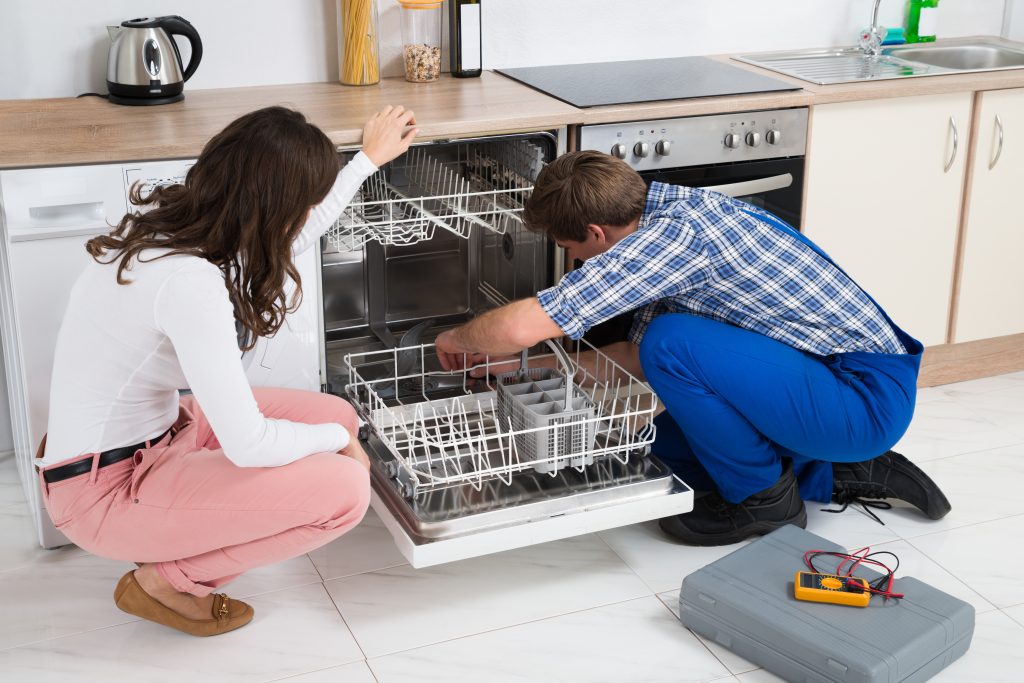1. Dishwasher Won’t Start
Possible Causes
- Power supply issues
- Door latch not properly closed
- Faulty control panel or timer
Solutions
First, check if the dishwasher is properly plugged in and that the circuit breaker hasn’t tripped. Ensure the door latch is securely closed since most dishwashers won’t start if the door isn’t fully latched. If these checks don’t help, the control panel or timer might need replacement, which may require professional repair.
2. Dishwasher Does Not Drain Properly
Possible Causes
- Clogged drain hose or filter
- Garbage disposal connection blocked
- Faulty drain pump
Solutions
Inspect the drain hose for kinks or blockages and clear any debris. Clean the dishwasher’s filter, which traps food particles. If your dishwasher drains into a garbage disposal, make sure it’s clear. For a malfunctioning drain pump, testing and replacement might be necessary.
3. Dishwasher Leaks Water
Possible Causes
- Damaged door gasket or seal
- Loose or cracked water inlet valve
- Overfilled dishwasher
Solutions
Check the door gasket for cracks or debris and replace it if damaged. Tighten any loose water inlet valves and inspect hoses for cracks or leaks. Avoid overloading the dishwasher, which can cause water to spill out during the cycle.
4. Dishes Not Getting Clean
Possible Causes
- Clogged spray arms
- Using wrong detergent or insufficient detergent
- Overloading the dishwasher
Solutions
Remove and clean the spray arms to ensure water can flow freely. Use dishwasher-specific detergent and avoid using regular dish soap, which can cause excess suds. Load dishes properly without overcrowding to allow water circulation.
5. Dishwasher Making Strange Noises
Possible Causes
- Foreign objects in spray arm or pump
- Faulty motor or pump bearings
- Worn-out motor or pump components
Solutions
Check for broken glass, bones, or other debris trapped in the spray arm or pump area. If the noise persists, the motor or pump bearings may be worn and require replacement by a professional.
6. Dishwasher Smells Bad
Possible Causes
- Food debris stuck in filter or drain
- Mold or mildew buildup
- Standing water inside the dishwasher
Solutions
Clean the dishwasher filter and drain regularly to remove trapped food particles. Run a cleaning cycle with dishwasher cleaner or a mixture of vinegar and baking soda to eliminate odors. Leave the dishwasher door slightly open after use to prevent mold growth.
Preventive Maintenance Tips for Your Dishwasher
1. Regular Cleaning
Clean the filter, spray arms, and door seals monthly to prevent buildup and maintain performance.
2. Use the Right Detergent
Always use detergent designed for dishwashers to avoid residue and excessive suds.
3. Avoid Overloading
Ensure dishes are spaced properly to allow water and detergent to circulate.
4. Check Water Temperature
Dishwashers perform best with hot water between 120°F and 140°F.
5. Inspect Hoses and Connections
Regularly check for leaks or wear and replace damaged hoses promptly.
When to Call a Professional
Some dishwasher issues require expert attention, especially problems with electrical components, motors, or internal pumps. If you’ve tried basic troubleshooting and the appliance still isn’t working correctly, contacting a certified repair technician is the safest choice.
Conclusion
Understanding common dishwasher problems and how to fix them can save time and money while keeping your appliance running smoothly. From drainage issues to cleaning problems and leaks, many fixes are simple DIY tasks. Regular maintenance also plays a crucial role in extending the life of your dishwasher. If problems persist, don’t hesitate to seek professional help.
